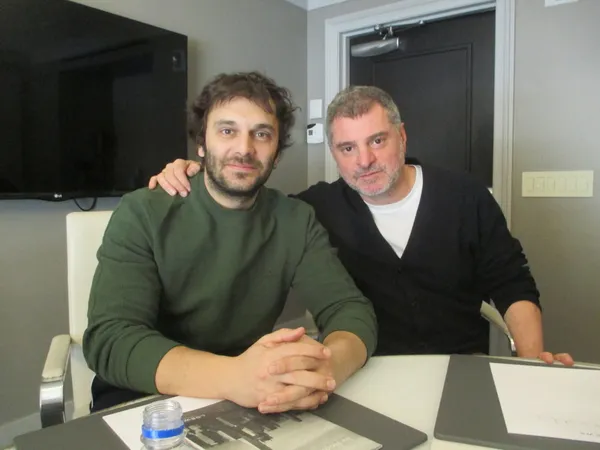 |
| The Trouble With You (En Liberté!) star Pio Marmaï with director Pierre Salvadori: "Write it down. I prefer being a bastard." Photo: Anne-Katrin Titze |
New York's 2019 uniFrance Rendez-Vous with French Cinema opening night film at the Film Society of Lincoln Center was Pierre Salvadori's The Trouble With You (En Liberté!), co-written with Benoît Graffin and Benjamin Charbit, starring Adèle Haenel and Pio Marmaï with Audrey Tautou, Vincent Elbaz, and Damien Bonnard. The morning after the première, Pierre Salvadori and Pio Marmaï joined me for a conversation on rehearsing a scene to find the "right rhythm and logic", editors Isabelle Devinck (Salvadori's In The Courtyard) and Géraldine Mangenot (Thomas Bidegain's Les Cowboys, Stéphanie Di Giusto's The Dancer), Claude Lelouch's La Bonne Année with Lino Ventura, and Kim Novak in Alfred Hitchcock's Vertigo.
 |
| Pierre Salvadori on Pio Marmaï's character: "The thing about Antoine is that he is running after a chimera to catch back the time." Photo: Anne-Katrin Titze |
F Scott Fitzgerald knew how to impart the vast subjective potential of a smile in The Great Gatsby: "It was one of those rare smiles with a quality of eternal reassurance in it, that you may come across four or five times in life. It faced--or seemed to face--the whole eternal world for an instant, and then concentrated on you with an irresistible prejudice in your favour. It understood you just as far as you wanted to be understood, believed in you as you would like to believe in yourself, and assured you that it had precisely the impression of you that, at your best, you hoped to convey.
The Trouble With You (Cannes Film Festival Directors' Fortnight SACD Prize winner) foregoes subtleties in offering several severe versions of the smile. Pio Marmaï plays Antoine Parent, an innocent man who spent 8 years in prison for a crime he did not commit. His smile has become crazed; he is unhinged and injustice has made him unpredictable. Adèle Haenel as widowed Police Lieutenant Yvonne Santi mostly keeps a straight face with tiny smiles of wonder. Antoine's wife Agnès (Audrey Tautou) has been relegated to live her love mostly in her head. If reality does not match, she hits repeat. And there is Louis (Damien Bonnard) who has been pining for his colleague Yvonne for ages and cannot believe his luck when an unexpected invitation makes his dreams come true.
We start our conversation with a scene on a bus after Antoine is released from prison. He behaves in a way that anybody who ever rode public transportation prays to never encounter.
Anne-Katrin Titze: Your scene on the bus is terrific. It's complete madness - there in your eyes. We realise he has become unpredictable, having been innocently imprisoned for eight years. Can you talk a bit about that scene?
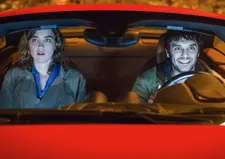 |
| Pierre Salvadori on Yvonne (Adèle Haenel) with Antoine (Pio Marmaï): "They're obsessed with different issues." |
Pio Marmaï: It was really funny, because I remember we had a rehearsal of this sequence.
Pierre Salvadori: On the train, going to the set from Paris.
PM: And it was absolutely brilliant during our travel.
PS: Yes!
PM: And when the moment came to do it on the set, it was really difficult for me to act this scene. To find the right rhythm and logic inside the head of the character was really difficult, especially when you are acting totally alone.
PS: When you speak out loud!
PM: When you speak out loud it's difficult to find what you talk about in that kind of craziness and the kind of violence, too. It's really difficult to find it as an actor. And I really want to thank the editors [Isabelle Devinck and Géraldine Mangenot], because they did a great job.
PS: You're not happy with what you did?
PM: This one is alright. The one I have much more regrets on is the one on the beach. When I'm walking.
PS: On the road by the beach. Is that alright to talk about?
 |
| Pierre Salvadori on Agnès (Audrey Tautou) with Antoine (Pio Marmaï): "The way she expresses her love is something that is very very moving to me and very brave." |
AKT: Yes, absolutely perfect. Please go on!
PS: It's a difficult process - the fact of speaking alone. I told him, I would love to hear you thinking out loud. It's not commenting about what you see. But the flow of the thoughts. I knew someone who stayed for a long time in jail and he said, the first thing you fight against is speaking alone when you are isolated. You are trying not to speak alone because it looks like you're becoming crazy in a way. And he said, obviously nobody achieves that.
AKT: Everybody speaks to themselves?
PS: Everybody speaks when they are alone for a long time. That was very interesting to me, because most of the time I don't like when a character speaks alone in order to give information to the audience. I don't like it because it's an easy process. But here, suddenly I was allowed to do that. And it helped me a lot for the character of Pio.
AKT: It didn't cross my mind that this scene was there simply to give information.
PS: It belongs to the character. And I needed the character of Adèle to know what was going on. Because you have to understand why she doesn't stop following him. This scene makes the characters aware - there is something wrong with this guy. Also it has a comedy side.
AKT: The scene made me think of something a colleague once told me. He was a student of Stanley Milgram, you know? Who did the electroshock experiments on authority? [Pierre and Pio nod in recognition] He was telling me about some of the exercises Milgram had them do. He had his students ask for seats on the subway and another exercise was having people in teams of two on a bus and one of them had to sing out loud their favourite song. The other person was noting the reactions of the other people on the bus.
PS: Normal people?
AKT: Yes, normal passengers.
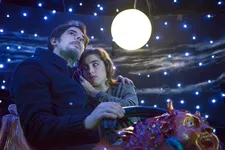 |
| Louis (Damien Bonnard) with Yvonne (Adèle Haenel) |
PS: Ah, this is very interesting because it's also a sequence that says that he is going to be alone most of the time. The thing about Antoine is that he is running after a chimera to catch back the time. He's lost eight years of his life and he thinks he can catch back this time which is totally impossible. You cannot regain lost time. The way he is trying to give meaning to this lost time is by being violent or by transgressing - which is human.
AKT: Repetition is very important in your movie. The good-night story that is repeated in variation. And the scene where you, Pio, come back and repeat your entrance for Audrey Tautou's character [Agnès Parent]. It's very absurd. Would you like to talk about this sequence?
PS: Oh yes! Because sometimes you're not always happy with what you do in your movies. You have the feeling this was good there and there, and this was not good. I think we are like sportsmen.
AKT: Athletes?
PS: We are like athletes. We know exactly when we have played a good game or a bad game. Like Pio said "I'm not happy with this beach scene." This sequence [of repetition], I am very happy with. Because it says something that is very important to me. That you can re-enchant your life through poetry. She is waiting for him, she is cleaning, and she is supposed to see him later. And he surprises her. She is not ready for this emotion. She is not ready for them to meet each other again. There he is too soon. So she says to him something that is totally …
AKT: Unnatural?
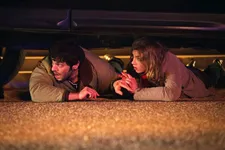 |
| Pio Marmaï on Antoine with Yvonne: "We didn't want to put any judgement on the character's behaviour and his anger. " |
PS: Unnatural. She says "Go back and please do it again." Both of them know that it's not true but the feeling it's going to produce IS real. To me it shows a belief in fiction and in poetry. I wanted it three times and the producer said "It's too much, Pierre, not three times! This is the same sequence!" And he does it again and she believes in what she imagined. Because she is almost crying she told him "You have to stop."
And then the third time, this is the magic of editing. Suddenly there is another point of view and it's Adèle's. And this sequence, which is to be melodramatic, turns to be a comedy, because she doesn't know what's going on. So, with exactly the same sequence you can do three different things by putting the camera at another angle. This sequence is really what the movie is about. The story about robbing the jewellery store suddenly seems like a movie. I was always trying to propose the idea that imagination is something that provides emotions and is essential to our daily life.
AKT: One of my favourite jewellery heist movies of all time is Claude Lelouch's La Bonne Année with Lino Ventura. It's the best. Another movie reference - when you [to Pio] are jumping into the water, did you feel like Kim Novak in Vertigo?
PM: I'm not sure I have seen this movie.
PS: Hitchcock's Vertigo?
AKT: Oh, you have to see it.
PM: I'm 22, so I have a lot of time in front of me. [Pio is actually 34.]
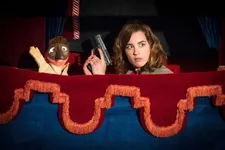 |
| Pierre Salvadori on Yvonne (Adèle Haenel): "She felt so bad because she lied, her husband put him in jail, and it's what we call "mauvaise foi"." |
AKT: Very, very bad excuse! Anyway, people aren't really listening in this film [The Trouble With You]. There is the running gag of the guy with the body parts in a bag. Things are happening right in front of people and they don't listen, they are elsewhere. Is that something you can relate to?
PS: That's the running gag in the movie, that people are so obsessed with their own emotions that they don't listen to each other. At the beginning this character [with the body parts] was there to tell the audience that this is not a cop movie. And it is not a funny detective movie. So we had the idea of someone arriving saying "Please arrest me."
We made him a running gag. As you said, there is something symmetrical in the movie. And also that idea that things go around and around and nobody is listening to anyone. At the end they find a kind of relief and joy. It's a process, how to relieve the anger and how to abandon it.
AKT: They need to let go?
PS: All the characters except Audrey Tautou are like that. They're obsessed with different issues.
AKT: And she is not?
PS: No, she is not. She is in love. The way she expresses her love is something that is very very moving to me and very brave. She is the only one holding the truth. Everybody is lying, nobody listens to anyone. But it's also the rules of comedy.
AKT: "Better a bastard than a victim," is a conclusion drawn in the film. What do you think about that with your 22 years?
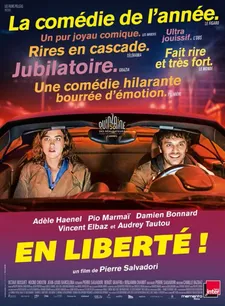 |
| En Liberté! (The Trouble With You) poster |
PM: 20 and a half, 21. It's really hard to pick sides. I'm not really sure which direction I'd choose if I were obliged to choose one. Of course, as a human being I'd prefer being a bastard than a victim.
PS: No!?
PM: I was waiting for this moment to announce it.
AKT: Now we know.
PM: Write it down. I prefer being a bastard.
PS: No, it's not true.
PM: It's a good question to ask each other in a way.
PS: People forget that she [Adèle Haenel's Yvonne] says that because she is feeling so guilty, so she tries to share it to re-comfort him. The opposite of Audrey who said all the time the truth to him. Adèle, she felt so bad because she lied, her husband [Police Captain Jean Santi played by Vincent Elbaz] put him in jail, and it's what we call "mauvaise foi".
AKT: Bad faith.
PS: I don't believe at all that it's better to be a bastard than a victim.
AKT: And Pio, you might change your mind after seeing Vertigo.
PS: We didn't want to put any judgement on the character's behaviour and his anger. I was surprised myself to shoot that like that. When he bites somebody's ear - I wanted to show it like it was almost noble. To me there is no monsters. A monster doesn't exist. Everybody is what he is. Exactly like this guy who is bringing every part, every bit of his dead aunt - he feels very guilty. To me it's moving. He's a monster but he wants to be caught, arrested.
AKT: Does wanting to be captured really make him less of a monster?
PS: In a way he is a monster but you understand what is going on with him.





















